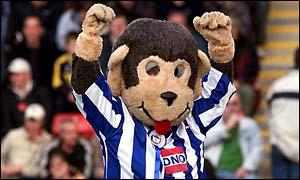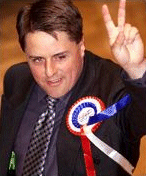![]()
The BNP and the Local Elections.
![]()
Old Hickory
On Thursday the local elections
went underway but the result was rather muted, with very little overall change
amongst the parties. The
elections are staggered over a four-year cycle rather than having all the
councils up for grabs at one time. This
year none of the shires were contested. A
mixed night left Labour, the Conservatives and Liberal Democrats with little
to celebrate. The result was that
Labour has 63 councils with 2,402 councillors, the Tories 42 councils with
2,006 councillors, the Liberal Democrats 15 councils with 1,262 councillors
with the others having 2 councils and 96 councillors.
The British National Party’s [BNP] result was described by Le Pen as
very encouraging on Friday because of their three new councillors – though
they controlled no councils. There
were 52 councils with no overall control.
The Tories were up by 238 councillors and the Liberal Democrats by 44
councillors but the loss of 339 councillors for the Labourites was not as bad
as they feared.
The turnout was 35%, the highest
for any local election since Labour came to power and up significantly from
the 29.6% in 2000. It was highest
in the areas that tried out the postal vote and a leading Labourite, Charles
Clarke, predicted that the General Election would be by post within a decade.
In Iain Duncan Smith’s first major electoral test, the Tories gained
Adur, Swale, Peterborough, Wokingham, and Enfield, where Michael Portillo lost
his seat in 1997. But they lost
power in Cheltenham, Worthing and Eastbourne.
Shadow Foreign Secretary Michael Ancram called the Conservative
performance “workmanlike”. He added: “We are at a very early stage in building our
policies and I think we can be satisfied with last night.” But there was talk in the press of discontent with the
leadership over there being less progress than expected.
Smith pressed on with his reforms in the party (Sunday 5 May) by
sacking Ann Winterton for telling a racist joke that had the punch line that
the Indianids were ten a penny.

A number of mayors arose but
hardly enough to make the reform anywhere near complete or the new norm in the
towns and cities of England. The
Liberal Democrats achieved a mayoral victory in Watford.
Labour now has mayors in Newham and Doncaster.
The Conservatives have a mayor from the closely fought mayoral contest
in North Tyneside. Two new mayors
were elected that caused a stir. The
one that many thought brought politics into disrepute was campaigning in a
monkey suit. He got the suit in
his job as a football team mascot where he was known as H’Angus the Monkey. But his actual name is Stuart Drummond. He is now mayor of Hartlepool.
But he immediately threw off the monkey suit and announced “I have
resigned as H’Angus.” He is
28 single and still lives with his parents.
The media loved it. They
asked all sorts of people what they thought of him. The local MP likes him and
looks forward to working with him and that is Peter Mandelson.
He told the Today Programme that he
was quite a bright fellow with considered policies and that the gimmick did
not matter much. The Monster Raving Loony Party thought that it was a wonderful event
and they wish they had thought of it.
The other mayor that mattered was
the one they call Robocop. He
is Ray Mallon, the pioneer of Zero
Tolerance in the UK. He is
mayor of Middlesborough and that is not far from Hartlepool where Mallon was
suspended as a police chief after making a success in the role in
Middlesborough. He is popular in
both places but was tied up in what many hold was a trumped up charge – a
result of envy at his success. He
now has little to do with policing as mayor but that is not how he sees it. He said “I intend to use every local authority power
possible to translate the fear of crime from the public to the criminal.”
The eight million pounds spent on the corruption enquiry that involved
Mallon and sixty others was thrown out earlier this year.
The Liberal Democrats won Norwich which had been a Labour stronghold for almost 70 years. Labour got more of their supporters out to vote in some of its traditional heartlands but the party still lost 20 seats. They lost overall power in Hull, where their deputy leader John Prescott is the MP. They also lost control of Stoke-on-Trent. The party’s vote dropped 14% in London boroughs, where it lost Lambeth, Enfield and Harrow. However, they did win back Bexley. The NHS support group that arose in the General Election continued their success at the council level. The Kidderminster campaign to save the town’s hospital repeated its victory at the general election. The Greens put up their best performance since the 1989 European elections by winning 7% where they stood and that was up two points up on 2000.

The Independent
featured the threat from the British National Party [BNP]on the front page,
taking up the whole of it, on Saturday 4 May.
They clearly think it is big news.
The BNP last had a councillor elected nine years ago.
The BNP victories are the first time a far right candidate has won a
seat since Derek Beackon in the London borough of Tower Hamlets in1993.
This time they got an average 27% of the vote in Oldham but failed to
win any seats there. However,
civil engineer David John Edwards did triumph in Burnley and was later
followed by his party colleague, Carol Hughes.
Their anthem is The Dam-busters
March. Like Eric Coates, they
are more typical in outlook to the 1950s than to pre-1939 Germany.
After recounts on Friday, Terry Grogan joined them to make three
councillors in the UK for the BNP – all in Burnley. Terry Grogan won by just four votes. He had suffered five recounts.
The turnout was higher than in most other places at 53%.
Similarly, the turnout in France on 5 May was high.
This phenomenon is good for democracy.
It is not often that over 50% of the electorate turn out to vote.
Edwards polled 898 votes. Carol
Hughes, a 43-year-old divorcee and sometime Labour Supporter, won a seat in
Rosegrove with Lowerhouse with 751 votes.
She used to be a care worker but she is now a section leader in a local
car parts factory. In her
election leaflet, she denied being a racist but she said that New Labour had
lost touch with the people of Burnley. Both
refused to speak to the media as they claimed to have been unfairly treated by
them in the run up to the local elections.
She has a sixteen-year-old boy, and Paul Harris (The Daily Mail, 4 May 2002, p7) reports that her neighbours like her
and they say the BNP is no longer as it used to be.
The BNP had run in 13 of the 15 Burnley wards.
The town’s Labour MP, Peter Pike, said the voters had been conned by
“racist” candidates but the BNP said they had been open on all the issues.
Labour chairman, Charles Clarke, who was on the ITV Dimbleby programme on 5 May, said that the BNP’s success was
“disappointing”. They were
only interested in strife. But
the BNP leader Nick Griffin called the result a “triumph”. He said that the BNP’s objective remained “an all white
Britain”. He added, “It is
very good news for us. It is an
amazing victory.”
The BNP averaged 18%, roughly the
same as Le Pen was reported to have had in his 5 May 2002 play off with Chirac
in France. That result was their
best so far and not so far off the peak the National Front reached in the
late-1970s. They fielded only 68
candidates for the almost 6,000 seats contested in England.
![]()

Top 50 books of all time : by Old Hickory:-
"I have limited the selection to the books I have read. I keep to the norm of not recommending to others books I have yet to read. Clearly, books I have not read by now suggests a judgement of some sort."
![]()
Two new mayors were elected that caused a stir. The one that many thought
brought politics into disrepute was campaigning in a monkey suit. He got
the suit in his job as a football team mascot where he was known as H’Angus
the Monkey. But his actual name is Stuart Drummond. He is now mayor
of Hartlepool. But he immediately threw off the monkey suit and announced
“I have resigned as H’Angus.”
![]()
![]()
Their
anthem is The Dam-busters March. Like Eric Coates, they are more typical
in outlook to the 1950s than to pre-1939 Germany. After recounts on
Friday, Terry Grogan joined them to make three councillors in the UK for the BNP
– all in Burnley. Terry Grogan won by just four votes. He had
suffered five recounts. The turnout was higher than in most other places
at 53%. Similarly, the turnout in France on 5 May was high. This
phenomenon is good for democracy.
![]()